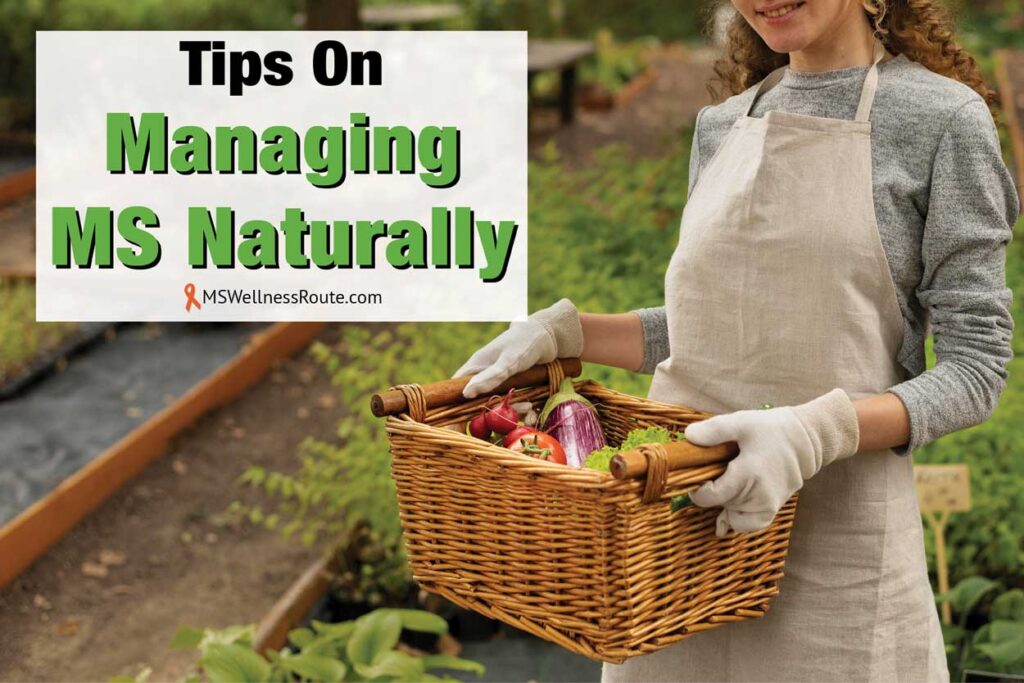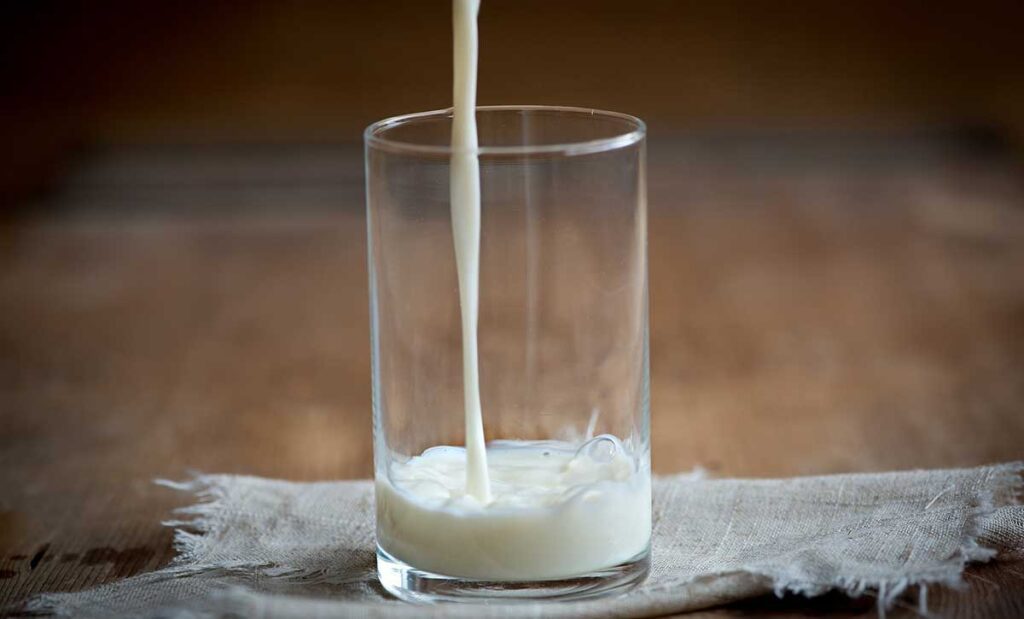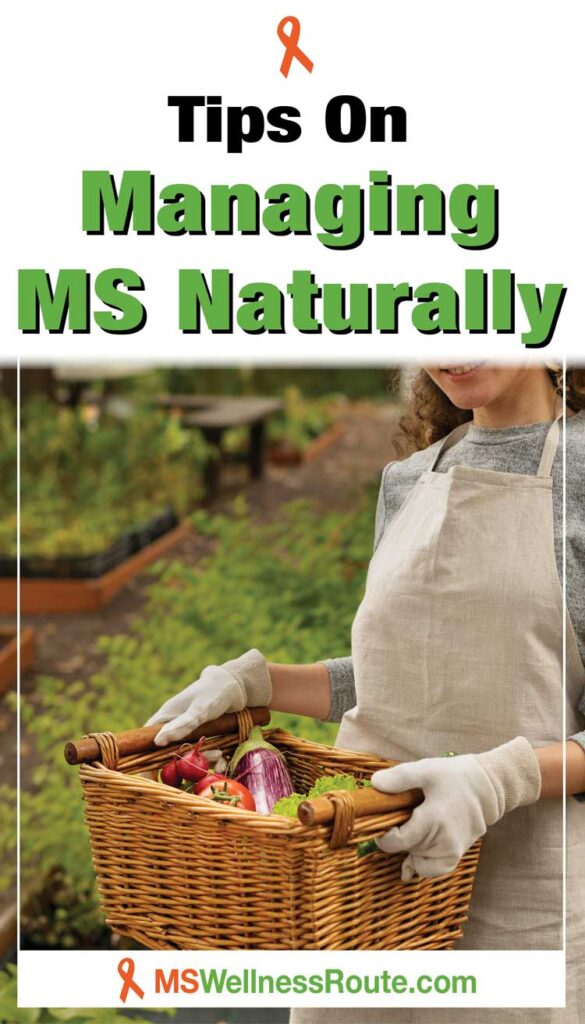Last Updated on April 10, 2024 by Cathy

Multiple Sclerosis (MS) is a disease that affects the central nervous system. There is no cure and the drugs for MS come with horrible side effects. Fortunately, managing MS naturally is possible with these tips.
Many people with MS look for natural ways to help manage their symptoms. And I’m one of those, I’ve been managing my MS naturally since 2005.
- Acupuncture. Acupuncture may be helpful in managing symptoms of MS. Such as pain, fatigue, and depression. Consult with a licensed acupuncturist to determine if this is a good option for you.
- Diet. Eating a balanced, nutrient-rich diet is important for overall health. Include anti-inflammatory foods such as fruits, vegetables, lean proteins, and healthy fats.
- Exercise. Regular exercise is extremely important. It can help reduce fatigue, improve strength, and increase flexibility. Low-impact exercises such as yoga, swimming, and walking are especially helpful. There are also online gyms for people with MS. My favorite is OptimalBody Personal Fitness.
- Stress management. Stress can exacerbate symptoms of MS. Find ways to manage your stress such as meditation, deep breathing, or mindfulness.
Epstein-Barr Virus
Epstein-Barr virus (EBV) is a common human virus that belongs to the herpes family. It is one of the most common viruses in the world. It’s known to cause infectious mononucleosis, also known as “mono.”
It can also cause other illnesses, such as certain types of cancer and MS. A 20-year study found EBV is the main cause of MS. Once infected with EBV there is a 32-fold increased risk for MS.
To Learn More About The Study Read:
EBV is transmitted through bodily fluids, such as saliva. It’s spread from person to person through close contact. Once someone is infected with EBV, the virus remains in their body for life. Although, most people do not experience any symptoms.
For people who do get diagnosed with MS, it’s about 5-10 years following an EBV infection. However, most adults have EBV but only a small percentage have MS. This proves EBV is not the only factor.
The cause of MS is due to EBV plus a combination of cofactors such as:
- Bacteria such as E. Coli, H. Pylori, Streptococcus A, and Streptococcus B
- Candida
- Heavy metals such as aluminum, copper, and mercury
- Mold
- Other viruses such as Cytomegalovirus, and Shingles
15 Foods to Avoid

MS is not an autoimmune disease where the body attacks itself. The body is trying to protect itself by attacking a pathogen that’s inside. We live in a toxic world and our bodies fight to stay healthy. But you have the ability to change. What you eat matters, use the power of food to stop MS.
Some people with MS have reversed their symptoms completely. However, everyone is different and you shouldn’t focus on this. Your first goal is to stop your MS from progressing. As you heal you should start to see your symptoms subside.
Your first step is to stop eating food that feeds diseases. Avoiding foods that create inflammation allows your body to heal. If you want to manage MS naturally you need to remove these foods from your diet.
It’s best not to do this “cold turkey.” I know this from experience, it was overwhelming and extremely depressing. It’s much easier if you go in steps, just make sure you are moving forward. Start with one such as dairy or gluten then move on to the next. You want to remove all foods that cause inflammation as quickly as possible.
15 tips on foods to avoid when managing MS naturally:
1. Dairy products
Avoid all dairy products, such as milk, cheese, and whey. Studies show women who drink more milk have more flares. Countries that consume more dairy have higher rates of MS. A 2022 study confirmed this is due to a milk protein called casein.
2. Gluten
Gluten is a protein found in many grains such as wheat, barley, and rye. They increase inflammation, especially in your intestinal tract, and contribute to autoimmune diseases.
3. Grains
Grains can get contaminated with mold. Mold is a fungus that is a cofactor for MS. It’s best to avoid all grains to help your body heal faster. You can add gluten-free grains back after you’ve healed.
4. Refined sugar
Sugar comes from both sugar cane and sugar beets. Your body breaks down refined sugar rapidly creating blood sugar spikes. It is also very addictive causing people to consume too much. This leads to diseases and weight issues. Plus, sugar beets are mostly GMOs. (Whole organic beets are safe to consume.)
5. Eggs
Dr. Terry Wahls, the author of The Wahls Protocol, found many people are allergic to eggs and don’t realize it. Eggs are one of the most common food allergens. I avoid eggs because they’ve given me guts pains since I was a small child. It’s best to avoid eggs.
6. Corn
Some people believe corn is a vegetable but it is a grain. It used to be healthy but now it’s mostly a GMO. Like other grains corn is prone to be moldy. It’s best to avoid all corn products.
7. Soy products
Like corn, soy used to be healthy but now it’s mostly a GMO. Some soy products have added MSG.
8. Refined oils and trans fat
Refined oils such as canola oil can damage your digestive system. Trans fat increases your risk of heart disease. Having MS puts you at a higher risk for heart disease. Avoid all foods that contain trans fat and refined oils such as canola oil.
9. Artificial colors, flavors, and sweeteners
These can contain ingredients that can disrupt your central nervous system. Always read the ingredients on labels to avoid these.
10. Natural flavors
Natural flavors are pretty much anything. They’re used to make food more flavorful but that doesn’t mean they are healthy. Natural flavors are not natural, they are made in a lab.
11. Pork
Pork is high in fat and it can pass parasites to you. Avoid pork and all pork products such as bacon.
12. Vinegar
Vinegar contains yeast. Ann Boroch, the author of Healing Multiple Sclerosis, recommends people with MS to avoid vinegar.
13. Farmed fish
Farmed fish live in tight quarters. They easily pass parasites and other diseases to each other.
14. MSG
MSG is a food additive, that causes inflammation in the brain. It builds up in your brain and deep into your brain tissue. Avoid foods such as condiments, dressings, and seasoning blends.
15. Citric acid
Citric acid comes from citrus fruits. But, the citric acid found in processed foods is often derived from corn. Corn, as you read earlier, is mostly a GMO. Avoid products that have citric acid in their ingredients.
Herbs to Manage MS

Herbs not only add flavor to our food, but they also heal. People have used herbs to manage different ailments for thousands of years. Herbs play a powerful role when you’re managing MS naturally. They help with symptoms such as alleviating muscle and joint pain, and sleep issues, by reducing inflammation.
Here are some herbs that have potential benefits for people with MS:
- Ashwagandha is an adaptogenic herb that helps reduce stress and inflammation. Both are factors that can exacerbate symptoms of MS.
- Burdock root is rich in antioxidants. It helps remove toxins from the blood and cleanses the lymphatic system. It also helps reduce symptoms caused by autoimmune diseases.
- Cannabis is a controversial herb that some people with MS use. They claim it helps manage symptoms such as pain, spasticity, and sleep disturbances. However, cannabis is illegal for medicinal use in some countries and states.
- Ginger is another anti-inflammatory herb. It helps reduce inflammation in the body and improve digestion. You can add it to food or take it as a supplement.
- Ginkgo biloba is an herb that may help improve cognitive function. This is a common symptom in people with MS.
- Turmeric is a spice with powerful anti-inflammatory properties. It helps reduce inflammation in the body, including the central nervous system. It is often used in cooking or taken as a supplement.
Vitamins
Vitamin B12 is essential for the proper functioning of the nervous system. It also helps with the formation of red blood cells. Studies show that people with MS may have lower levels of vitamin B12. Supplementing with this vitamin may improve symptoms such as fatigue and cognitive function.
In addition, some people with MS may have difficulty absorbing vitamin B12 from food. Either due to gastrointestinal problems or the use of certain medications. Therefore, it is important to have your levels checked and take a supplement. The vitamin B12 I take is Liquid B12 by Vimergy.
Always talk with your doctor before starting any new supplements. Supplements can interact with certain medications and can be harmful in some cases.
Tips on Managing MS Naturally
Don’t listen to people who are negative and say you can’t manage MS naturally. I’m proof, I’ve been managing my MS naturally for years and I’m not in a wheelchair. You can reverse your neurology symptoms when following these tips for managing MS naturally.
MS is caused by the viral infection EBV and other pathogens. Drugs for MS are not a cure, they only slow the disease process if they work. Eating and living a healthy lifestyle improves your overall health. Eat a healthy diet, exercise, reduce your stress, and get a good night’s sleep.
Include herbs and supplements that kill bacteria and viruses such as:
- Basil
- Garlic
- Ginger
- Lemon balm
- Oregano
- Peppermint
- Rosemary
- Sage
Heavy metals are a cofactor so include foods that remove heavy metals such as:
- Atlantic dulse
- Barley grass juice powder (it’s gluten-free)
- Cilantro
- Garlic
- Lemon (I drink lemon water throughout the day)
- Spirulina
- Wild blueberries (you can find these in the frozen section at many grocery stores)
Use these tips for managing MS naturally and getting your life back. Don’t let MS steal your life away from you. Start today so you can start feeling better.
Quick Links To Information In This Post:

Free Wellness Library!
Subscribe for free and I’ll send you the password to my secret library filled with many printables for your wellness journey.
Want to remember this health tip? Pin it to your Pinterest board!

Images by Freepik and jcomp on Freepik
Resources for tips on managing MS naturally:
https://www.mayoclinic.org/diseases-conditions/cmv/symptoms-causes/syc-20355358
https://www.science.org/doi/10.1126/science.abj8222
Tips on Managing MS Naturally





